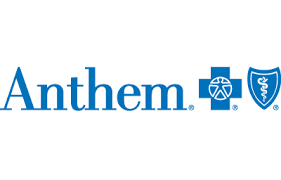Anthem vs. Blue Cross: Medicare Plans
Anthem and Blue Cross Blue Shield (BCBS) are well-known providers in the Medicare market. Both offer Medicare Advantage (Part C), Medicare Supplement (Medigap), and Medicare Part D plans.
In a nutshell:
Anthem is a better option in terms of added benefits, but only offers plans in 14 states.
BCBS has a larger provider network and more predictability for out-of-pocket costs.
In this article, I’ll stack up the two providers against each other and compare their differences regarding:
- Plan availability
- Premiums and other out-of-pocket costs
- Customer satisfaction and ratings
-
Note:
Anthem and Blue Cross Blue Shield are linked, but they aren’t the same company.
Think of Blue Cross Blue Shield as the big umbrella with a bunch of independent companies underneath it, and Anthem is one of those companies.
So, let’s jump right in and start with an overview of both Anthem and BCBS.

Anthem Medicare Plan Highlights
Pros:
- Personalized benefits include a Flex Card to use funds for transportation, utilities, or assistive devices
- Access to 24/7 telehealth services and a 24/7 nurse line
- Some plans include dental, vision, and hearing benefits, as well as fitness memberships like SilverSneakers
Cons:
- Only available in 14 states
- Lower-than-average customer ratings
- Some plans have high annual maximums
Anthem State Availability
| California | Missouri* |
| Colorado | Nevada |
| Connecticut | New Hampshire |
| Georgia | New York* |
| Indiana | Ohio |
| Kentucky | Virginia* |
| Maine | Wisconsin |
*Missouri – excluding 30 counties in the Kansas City area
*New York – in the New York City metropolitan area and upstate New York
*Virginia – excluding the Northern Virginia suburbs of Washington, D.C.
In Summary:
Anthem’s plans come with great benefits like the Flex Card and a SilverSneakers fitness membership, but they’re only available in 14 states and don’t exactly have the best star ratings.
Some of their plans also have higher network maximums of up to $10K.

Blue Cross Medicare Plan Highlights
Pros:
- Offers plans in 48 states, Washington D.C., and Puerto Rico
- Many plans include a prepaid card that can be used for groceries, utilities, and other health-related expenses
- Many Advantage plans include coverage for dental, vision, hearing
- Plans often include fitness memberships such as SilverSneakers
Cons:
- Ratings can differ between BCBS companies
- Medigap premiums may be higher than other top competitors
In Summary:
BCBS is the third-largest provider of Medicare Advantage and offers some great perks, including a prepaid benefit card and a fitness membership.
However, some Medigap plans may have higher premiums than other leading competitors.
Next up, let’s start highlighting the big differences between these two providers.
Anthem vs. Blue Cross: Plans Offered
Medicare Advantage Plans
Medicare Advantage (Part C) is a private insurer plan that replaces Original Medicare Parts A and B and offers extra benefits.
Anthem offers several Medicare Advantage plans, including HMO, HMO-POS, PPO, and SNP options.
Blue Cross Blue Shield offers a wider variety of Medicare Advantage plans, including HMOs, PPOs, PFFS, and SNPs. BCBS also stands out with its $0 out-of-pocket maximum options on some plans, making it easier to predict costs.
Medigap (Medicare Supplement Insurance) Plans
Medigap policies supplement Original Medicare, covering gaps such as copayments, coinsurance, and deductibles.
Anthem provides standardized Medigap plans across 14 states, complemented by additional benefits such as access to the SilverSneakers fitness program and discounts on prescription drugs. Members can opt for dental and vision bundles for an additional premium.
Generally, Anthem’s Medigap monthly premiums are more affordable than those of BCBS.
You can find a Medigap policy with a BCBS provider (or an affiliate) in every state. BCBS Medigap plans also allow members to see any Medicare-accepting doctor or hospital, with coverage available across most of the U.S.
Prescription Drug Plans (Part D)
Original Medicare only covers prescriptions received during a hospital stay or for outpatient surgery. Medicare Part D prescription drug plans are standalone plans that supplement Original Medicare.
Anthem has two Part D plans in 13 states: MediBlue Rx Standard and MediBlue Rx Plus (the names might change a bit depending on where you live). Plan premiums range from $50 to $190 a month.
Anthem’s Part D plans are on the pricier side, but their higher-tiered plan includes a $0 deductible option.
Blue Cross Blue Shield has many standalone Part D plans (depending on your state) with various cost-sharing options, including some with low $40 deductibles. Available in 48 states, D.C., and Puerto Rico, these plans usually come with a large pharmacy network to help members save on prescriptions through preferred providers.
Next, let’s talk a little more about premiums and other out-of-pocket costs.
Anthem vs. Blue Cross: Costs
Medicare Advantage Premiums
Anthem offers around 49% of its Medicare Advantage plans with a $0 premium. BCBS isn’t far behind, with about 41% having a $0 premium.
Medigap Premiums
When comparing Medigap premiums, it really depends on factors like:
- Where you live
- Your age
- Your gender
- Your tobacco use
- The type of coverage you’re looking to buy.
To give you an idea, I’ve put together sample monthly premiums of the most popular Medigap plans (G, F, N, and A) in several states:
-
Anthem in Colorado:
Medigap Plan Premium G
$144.88 F $195.02 N $130.09 A $133.41 Quotes are for a 65 y/o nonsmoking female in CO zip code 80111. -
Anthem in Ohio:
Medigap Plan Premium G
$132.37 F $183.59 N $130.98 A $139.61 Quotes are for a 65 y/o nonsmoking female in OH zip code 43210.
-
BCBS in Florida:
Medigap Plan Premium G
$214.30 F $243.50 N $176.60 A $175.30 Quotes are for a 65 y/o nonsmoking female in FL zip code 32506. -
BCBS in Texas:
Medigap Plan Premium G
$153.86 F $206.78 N $119.57 A $264.00 Quotes are for a 65 y/o nonsmoking female in TX zip code 77002.
Based on this information, Anthem’s Medigap premiums are generally lower than BCBS’s. However, keep in mind that it will always vary based on several factors.
Out-of-pocket maximums
Anthem’s out-of-pocket maximums vary depending on the Medicare Advantage plan, with in-network maximums differing from combined out-of-network limits, which can go up to $10,000.
With BCBS, some Medigap plans come with a $0 out-of-pocket maximum. That’s one of the main differences between Medigap and Medicare Advantage. Medigap has FAR LESS out-of-pocket costs.
Drug deductibles
Anthem’s drug deductible varies by plan, with some offering a $0 deductible but others charging up to $42 monthly.
BCBS plans come with some lower drug deductible options, starting as low as $40, but the maximum can go up to $545, similar to other major carriers.
The next question we asked ourselves when comparing these two providers was: how satisfied are current members?
Anthem vs. Blue Cross: Ratings
According to the Centers for Medicare & Medicaid Services (CMS), Anthem’s average star rating is 3.52, which is slightly below the national average of 3.92. While Anthem scores well in states like Ohio, it ranks lower in states like California, so satisfaction can vary depending on where you live.
Blue Cross Blue Shield averages a slightly higher rating at 3.96, close to the national average. Member satisfaction also depends on the location and specific BCBS affiliate, but it tends to score particularly high in states like New York and Texas, which speaks to its strong regional reputation.
Our opinion (based on experience) is that BCBS members are generally happier with their provider than those with Anthem.
Anthem vs. Blue Cross: Final Thoughts
All in all, Blue Cross Blue Shield tends to be a better pick than Anthem.
BCBS is available in more locations and usually has more satisfied customers. However, if you’re really set on a slightly lower monthly premium, Anthem is worth considering.
Choosing between Anthem and BCBS really depends on your priorities. If you live in an Anthem-covered area and like the extra benefits they offer (like the Flex Card), then they could be your pick. But if you’re after more predictable costs and flexible plan options, BCBS might be the better option.
If you need help comparing these providers or have any other questions about Medicare plans, feel free to contact us. We’re happy to help!
Sources: BCBS Medicare Options | Anthem Medicare Options
FAQs
- What is Anthem’s “Flex Card” and how does it work?
- Does Blue Cross Blue Shield offer any unique features?
- How do customer satisfaction ratings compare between Anthem and Blue Cross Blue Shield?
- Which company is better for personalized coverage options?
- Are there any other important factors to consider when choosing between Anthem and Blue Cross Blue Shield?
